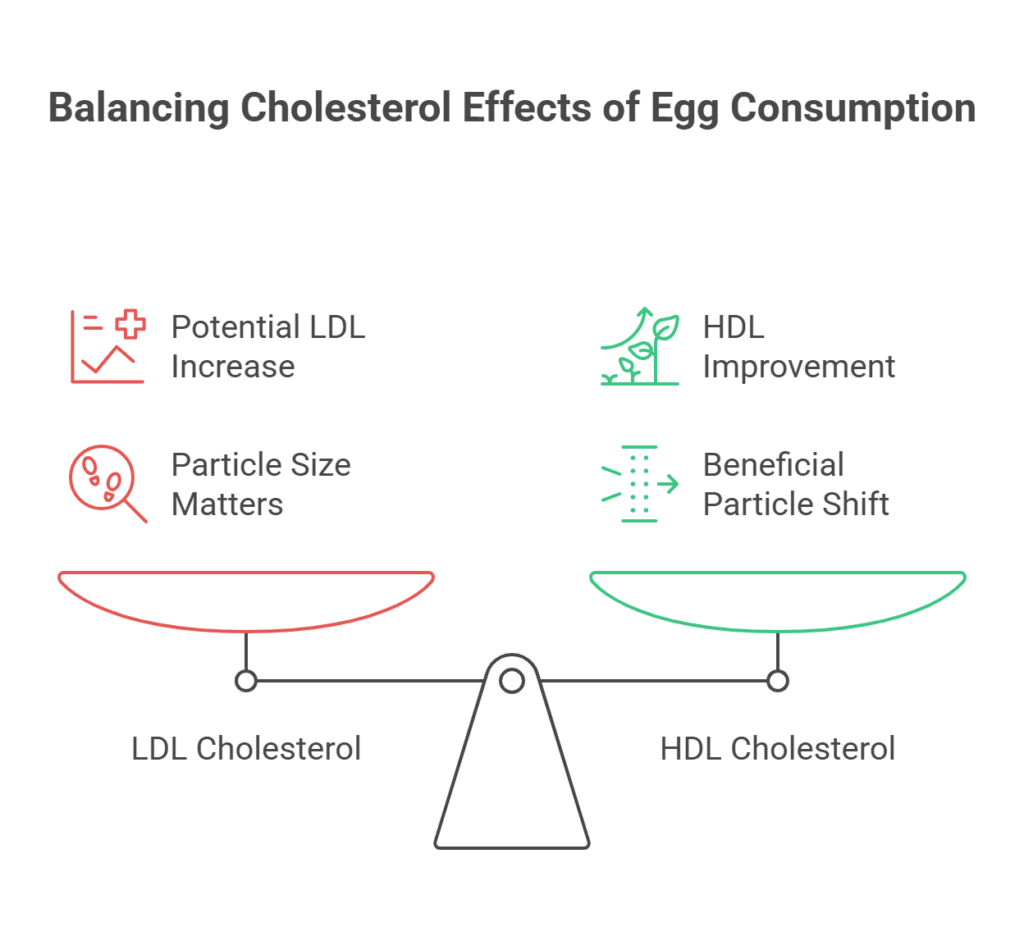Let’s just get this out of the way: eggs have been the poster child for dietary controversy for decades. One minute, they’re the breakfast of champions. The next, they’re public enemy number one for your arteries. You’ve probably heard it all: “Eggs will skyrocket your cholesterol!” or “Eggs are totally fine; eat as many as you want!” So, which is it? And why does the answer seem to change every few years? Funny thing is, the real story is way more nuanced than any headline or viral tweet. If you’re on the fence about your morning omelet, buckle up. We’re about to take a deep dive into the science of eggs and cholesterol, HDL, LDL, and all the weird, wonderful mechanisms in between.
The Basics: What Even Is Cholesterol, and Why Should You Care?
Okay, quick refresher. Cholesterol isn’t some evil invader; it’s a waxy, fat-like substance that your body actually needs. It’s in every cell, helping to build hormones, vitamin D, and even the membranes that keep your cells from falling apart. But here’s the kicker: not all cholesterol is created equal.
- LDL (Low-Density Lipoprotein): Often called “bad” cholesterol. Too much of it can build up in your arteries, leading to blockages, heart attacks, and all sorts of trouble.
- HDL (High-Density Lipoprotein): The “good” guy. It helps shuttle cholesterol away from your arteries and back to your liver, where it can be broken down and removed.
So, when people talk about “high cholesterol,” what they really mean is too much LDL and not enough HDL. But where do eggs fit into this picture? Let’s crack that shell.
The Science of Eggs and Cholesterol
How Dietary Cholesterol Gets Into Your System (Or Doesn’t)
Here’s something most people don’t realize: your body is a cholesterol-making machine. Even if you never ate a single egg, your liver would still churn out about 1,000 mg of cholesterol a day. Compare that to the 180-200 mg you get from a single egg. See the difference? But wait, it gets weirder.
When you eat more cholesterol (like from eggs), your body usually compensates by making less. It’s a balancing act, kind of like a thermostat for your blood. For most people, this means that eating eggs doesn’t actually cause a huge spike in blood cholesterol. But, and this is a big but, there are exceptions. Some people, called “hyper-responders,” do see a bigger jump. More on them in a bit.
The Absorption Game: Enter the NPC1L1 Receptor
Let’s get a little nerdy for a second. The real gatekeeper for cholesterol absorption is a protein in your gut called the Niemann–Pick C1-like 1 (NPC1L1) receptor. Think of it as a bouncer at the club, deciding how much cholesterol gets in. Some people have a version of this receptor that’s super strict and barely lets any cholesterol through. Others? Not so much. They’re the ones who absorb more, and, as you might guess, they’re at higher risk if they eat a ton of cholesterol-rich foods like eggs. Genetics, right? Always keeping things interesting.
The Liver’s Role: Your Body’s Cholesterol Traffic Cop
So, you’ve eaten your eggs. Now what? Your liver steps in. If it senses more cholesterol coming in from your diet, it’ll usually dial down its own production. It might also ramp up the process of getting rid of cholesterol, either by converting it to bile acids (which you then, well, flush out) or by sending it back into your intestines for another round of absorption (yes, your body recycles cholesterol, because why not?).
But here’s where things get a little dicey. If you’re a “hyper-responder,” someone whose body doesn’t adjust as well, your liver might not compensate enough. That means more cholesterol ends up in your blood, especially LDL. For most people, though, the system works pretty well. The result? Eating eggs has only a modest effect on blood cholesterol for the majority of folks.
Saturated Fat: The Real Villain
Let’s not beat around the bush: if you’re worried about your cholesterol, you should probably be paying more attention to saturated fat than to eggs themselves. Why? Because saturated fat, found in butter, cheese, bacon, and all those delicious breakfast sides, has a much bigger impact on raising LDL cholesterol than dietary cholesterol does. In fact, studies show that swapping out saturated fat for unsaturated fat (think olive oil, nuts, avocados) can lower your LDL and reduce your risk of heart disease. So, if you’re eating your eggs with a side of bacon, sausage, and buttered toast, well… that’s a different story. The eggs aren’t the main problem; it’s the company they keep.
HDL, LDL, and the Egg Effect: What the Studies Actually Say

LDL: The “Bad” Guy
Here’s where things get a little complicated. Yes, some studies show that eating eggs can raise LDL cholesterol a bit, especially in hyper-responders. But, and this is important, it often raises HDL cholesterol, too. That’s the good stuff. In fact, the ratio of LDL to HDL (which is a better predictor of heart disease risk than either number alone) usually stays about the same or even improves slightly.
And get this: not all LDL is created equal. There are big, fluffy LDL particles (less likely to cause trouble) and small, dense ones (the real troublemakers). Some research suggests that eggs tend to increase the larger, less dangerous LDL particles. So, even if your LDL goes up a little, it might not be as big a deal as you think.
HDL: The “Good” Guy Gets a Boost
Now for some good news. Eggs are actually pretty good at raising HDL cholesterol. That’s right, eating eggs can help increase the cholesterol that helps clean out your arteries. Who doesn’t love a good plot twist?
The Big Picture: What About Heart Disease?
You’d think, with all this cholesterol talk, that eating eggs would be a one-way ticket to heart disease. But the evidence just doesn’t back that up. Large studies, including meta-analyses of hundreds of thousands of people, have found no significant link between moderate egg consumption (up to one egg a day) and heart disease in healthy people. In fact, some studies even suggest a slight reduction in risk for certain types of heart disease.
The Role of Genetics: Why One Size Doesn’t Fit All
Here’s where things get really interesting (and, if I’m honest, a little frustrating). Not everyone responds to eggs the same way. Some people, about 25% of the population, are “hyper-responders.” For them, eating eggs can cause a bigger jump in both LDL and HDL cholesterol. But even then, the LDL/HDL ratio usually doesn’t get worse. And for the other 75%? The effect is minimal.
What makes someone a hyper-responder? Genetics, mostly. Variations in genes that control cholesterol absorption and metabolism (like that NPC1L1 receptor we talked about earlier) play a big role. There’s also some evidence that your gut microbiome, the trillions of bacteria living in your intestines, can influence how your body handles cholesterol. Wild, right?
The Saturated Fat Sidekick: Eggs Don’t Travel Alone
Let’s circle back to something important: eggs are actually pretty low in saturated fat. A large egg has about 1.5 grams of saturated fat, compared to, say, a tablespoon of butter (which has 7 grams). So, if you’re eating eggs on their own, you’re not getting a huge dose of the stuff that really raises LDL cholesterol.
But, and this is a big but, most people don’t eat eggs in isolation. They’re often paired with foods high in saturated fat (hello, bacon and cheese). So, if you’re worried about your cholesterol, it’s not just about the eggs. It’s about the whole meal.
The Mechanisms: How Does It All Work, Biochemically Speaking?
Alright, let’s get a little more granular. When you eat an egg, here’s what happens:
- Digestion: The cholesterol in the egg gets emulsified by bile acids in your gut, making it easier to absorb.
- Absorption: The NPC1L1 receptor in your intestinal cells grabs some of that cholesterol and pulls it into your bloodstream.
- Transport: The cholesterol gets packaged into particles called chylomicrons, which travel through your lymphatic system and eventually end up in your liver.
- Regulation: Your liver senses the incoming cholesterol and usually dials down its own production. It might also increase the amount of cholesterol it sends out in bile.
- Distribution: Some cholesterol gets sent out in LDL particles (the “bad” kind), some in HDL (the “good” kind), and some gets used for making hormones, vitamin D, and cell membranes.
But here’s the twist: your body is constantly adjusting. If you eat more cholesterol, it usually makes less. If you eat less, it makes more. It’s a dynamic system, not a simple “input equals output” equation.
The Exception to the Rule: Diabetes and Heart Disease Risk
Now, before you go making a 12-egg omelet, a quick word of caution. Some studies suggest that people with diabetes may be more sensitive to dietary cholesterol. For them, high egg consumption might be linked to a higher risk of heart disease. The science isn’t totally settled, but if you have diabetes or a history of heart disease, it’s worth talking to your doctor about how many eggs are right for you.
The Takeaway: Should You Eat Eggs or Not?
So, after all that, what’s the bottom line? Here’s the scoop:
- For most people, eating eggs in moderation (up to one a day) is unlikely to have a major impact on blood cholesterol or heart disease risk.
- The effect of eggs on cholesterol is much smaller than the effect of saturated fat.
- If you’re a hyper-responder (and you probably don’t know unless you get tested), you might see a bigger jump in cholesterol, but even then, the LDL/HDL ratio usually doesn’t get worse.
- If you have diabetes or a history of heart disease, you might want to be a little more cautious.
- The way you eat your eggs, and what you eat with them, matters. Pair them with veggies, whole grains, and healthy fats, and you’re golden.
Frequently Asked Questions
Can I eat eggs every day?
For most healthy people, yes. The science says it’s fine. But if you have specific health conditions, check with your doctor.
What about egg whites vs. whole eggs?
Egg whites have no cholesterol, but most of the nutrients (and flavor) are in the yolk. Unless you’ve been told to limit cholesterol, whole eggs are usually fine.
Are there any benefits to eating eggs?
Absolutely. Eggs are packed with protein, vitamins, minerals, and antioxidants like lutein and zeaxanthin (great for your eyes). They’re also one of the most affordable sources of high-quality protein out there.
What’s the healthiest way to eat eggs?
Boiled, poached, or scrambled with a little olive oil. Skip the butter, cheese, and bacon if you’re watching your cholesterol.
Final Thoughts: The Egg Isn’t the Villain; It’s the Context That Counts
If I’m honest, the whole “eggs and cholesterol” debate is a classic case of missing the forest for the trees. It’s not about one food, one nutrient, or one number on your blood test. It’s about your overall diet, your genetics, your lifestyle, and, yes, sometimes just plain luck. So, don’t be afraid of your breakfast. Enjoy your eggs, just maybe skip the side of bacon every once in a while.








